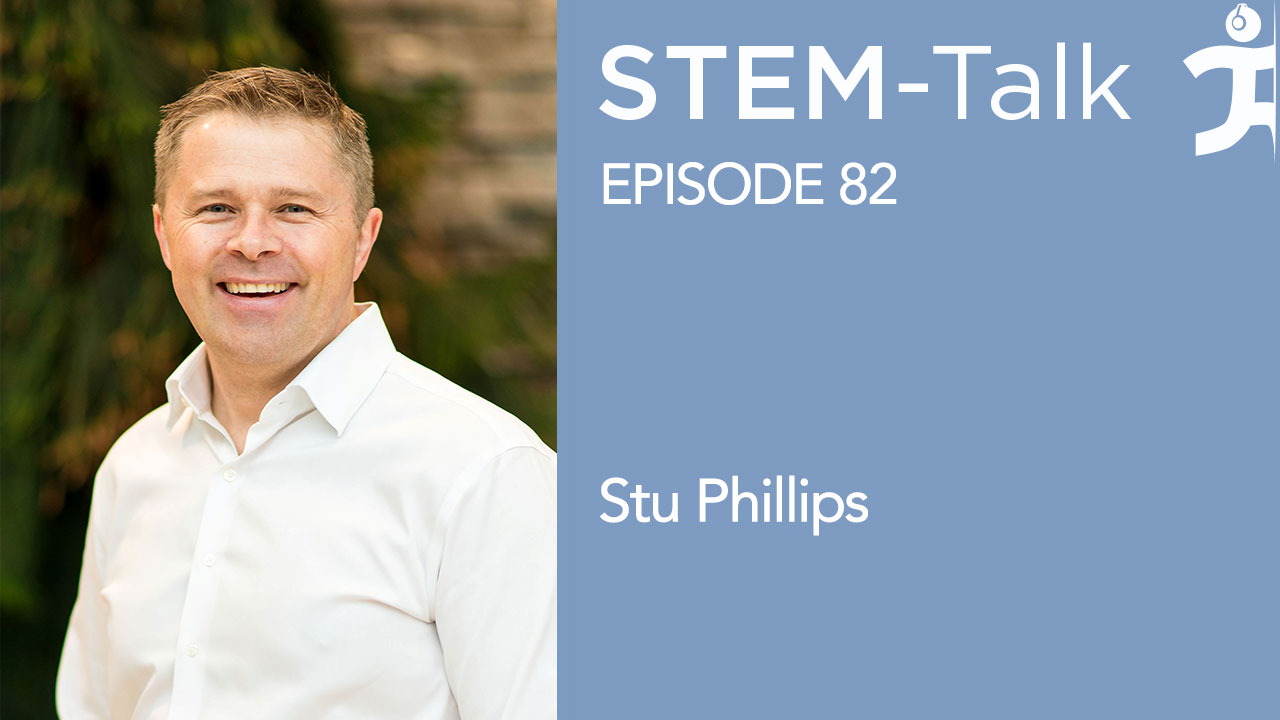STEM-Talk
Episode 82: Stu Phillips discusses the importance of dietary protein and its role in muscle
// Feb 5, 2019

Our guest today Dr. Stuart Phillips, a professor of kinesiology at McMaster University in Ontario, Canada, who is best known for his research into muscle health and the benefits of dietary protein.
Stu is the director of the McMaster Physical Activity Centre of Excellence, a state-of-the-art exercise research and training center. It is devoted to studying and improving the health and well-being of older adults as well as people with chronic diseases and disabilities.
In addition to his work in the kinesiology department at McMaster, Stu is adjunct professor in the university’s School of Medicine. He is a fellow of the American College of Sports Medicine and the American College of Nutrition. He received the New Investigator Award from the Canadian Institutes for Health Research, the Ontario Premier’s Research Excellence Award, and the Young Investigator Award from Canadian Society for Exercise Physiology.
In today’s interview we discuss:
[00:08:19] Dawn introduces the importance of dietary protein and its role in muscle health, and tissue regeneration more generally, which makes it one of the only macro nutrients we need on a daily basis.
[00:10:59] A recent study (2017) showed that whole eggs promoted a greater amount of muscle protein synthesis than egg whites, suggesting that there may be benefits to the extra nutrients found in the egg yolk. [00:12:53] Why Stu believes the recommended daily allowance for protein is too low. [00:14:06] The differences between animal and plant-based protein. [00:16:31] The phenomenon of muscle synthesis (anabolism) and catabolism. [00:17:54] Highlights of the recent findings coming out of Kevin Tipton’s group which indicates that the dose-response relationship may depend on the amount of muscle tissue that was recruited during exercise, with the ingestion of 40 g protein further increasing muscle protein. [00:20:43]A 2013 paper from Stu’s group titled, “Dose-dependent responses of myofibrillar protein synthesis with beef ingestion are enhanced with resistance exercise in middle-aged men.” [00:27:52] Stu’s thoughts on the recommendation of pre-sleep protein feeding. [00:37:52] An overview of the Physical Activity Centre of Excellence, a state-of-the-art, exercise research and training lab at McMaster. [00:43:37] The importance of maintaining healthy functional muscle mass and function as we move into middle and later life. [00:46:56] Stu’s paper, “Muscle Disuse as a Pivotal Problem in Sarcopenia-Related Muscle Loss and Dysfunction.” [00:50:25] The need to add more protein to our diets as we get older, which is something that Dr. Valter Longo discussed on episode 64 of STEM-Talk. [00:56:24 How fasting affects muscle protein turnover, which were topics covered in episode 7 of STEM-Talk, an interview with Mark Mattson, and episode 79, which was an interview with Satchin Panda, author of the “The Circadian Code.” [00:57:32] Whether a ketogenic diet with sufficient protein would in any way be detrimental to muscle mass. [01:05:47] Stu’s thoughts on a study that was conducted on behalf of the American College of Sports Medicine that found supplementation with HMB failed to enhance body composition to a greater extent than a placebo.Show notes
[0:02:51] Stu talks about being born in the UK but growing up in Canada. [00:03:09] Dawn asks about Stu’s passions for all kinds of sports as a kid. [00:03:27] Stu recalls his high school science teacher, who was responsible for getting him interested in biology and chemistry. [00:03:44] Dawn asks what led Stu to choose McMaster University after high school. [00:04:19] Ken brings up that Stu was captain of the Ruby team his senior year, and while it looked as though he was headed to a great season, things didn’t turn out as planned. He asks how that season led to Stu’s decision to focus on nutritional biochemistry. [00:05:16] Stu explains how he ended up at Waterloo University to work on a doctorate in physiology. [00:06:01] Dawn asks Stu why he headed off to Texas after graduating from Waterloo. [00:06:36] Dawn asks if it is true that after three years in Texas, Stu moved back to Canada to get married. [00:07:18] Stu talks about why he went back to McMasters to study protein, exercise, and muscle synthetic versus catabolic dynamics, among other things. [00:08:19] Dawn asks how Stu first became interested in the process by which protein plays a role in regenerating muscle, making it one of the only macro nutrients we need on a daily basis, and to give listeners an overview on the importance of dietary protein. [00:09:49] Dawn asks Stu how much of his work has focused on muscle- protein turnover and if changes in muscle-protein turnover directly correlate with changes in muscle growth. [00:10:59] Ken mentions that many protein-intervention studies use supplementation in the form of whey, which has a clear benefit from a muscle standpoint given its high leucine content and convenience. He goes on to mention, however, that some researchers are starting to look at interventions with whole food protein. A recent study (2017) showed that whole eggs promoted a greater amount of muscle protein synthesis than egg whites, suggesting that there may be benefits to the extra nutrients found in the egg yolk.Understanding this, Ken asks if it is possible that by taking an isolated supplement like whey, we are missing out on a spectrum of other nutrients found in protein rich whole foods? [00:12:53] Stu explains why he believes that the recommended daily allowance for protein is too low. [00:14:06] Dawn mentions that she is a vegetarian, and by that token has to be more creative about making sure she gets enough protein. She asks Stu to explain the differences between animal and plant-based protein. [00:15:20] Ken asks if it might be helpful for vegans or vegetarians to supplement with essential amino acids, provided that they are vegan approved. [00:16:31] Dawn asks Stu to elaborate on the phenomenon of muscle synthesis and catabolism, which are like a sinusoidal wave going from anabolism to catabolism. Over a 24-hour period, one may see more anabolism, then have a net improvement in muscle mass, and vice versa. [00:17:54] The currently accepted amount of protein required to achieve maximal stimulation of myofibrillar protein synthesis (MPS) following resistance exercise is 20–25 g. Ken asks Stu to discuss the recent findings coming out of Kevin Tipton’s group which indicates that the dose-response relationship may depend on the amount of muscle tissue that was recruited during exercise, with the ingestion of 40 g protein further increasing muscle protein. [00:20:43] Dawn explains that aging impairs the sensitivity of skeletal muscle to anabolic stimuli, such as amino acids and resistance exercise. She goes on to bring up a 2013 paper from Stu’s group which reported that, in the context of resistance exercise, “it appears that the MPS “machinery” in older muscles is less responsive to low and modest doses of protein. The key finding from this study being that in middle-aged men, ingestion of beef promotes a dose–response relation for myofibrillar MPS, with the greatest response occurring with ingestion of 170 g of beef … roughly 6 oz containing 36 g of protein. [00:22:45] Ken asks if given the leucine oxidation responses Stu reported, does it seem reasonable that approximately 170 g of beef is the maximally effective dose, after which additional protein would fail to increase MPS. [00:24:29] Stu discusses the issue of “protein timing” in relation to a bout of resistance training and total protein intake over the course of the day. [00:27:52] Multiple studies coming from Van Loon’s lab suggesting that 40 g of protein ingested before sleep can be beneficial for muscle protein synthesis, especially in older individuals.While consuming protein before bed may provide some benefits, it may also be detrimental from a circadian rhythm perspective. Forty g of protein equates to 7 eggs or 5 cups of milk or a substantial steak. Given the importance of sleep to anabolic and other processes, Ken asks Stu for his thoughts on the recommendation of pre-sleep protein feeding. [00:30:15] Ken asks if the observed benefit of pre-sleep protein could be driven more by topping up of the day’s total protein consumption, or if the timing of protein right before bed matters? [00:31:57] Ken asks for Stu’s thoughts on a 2017 paper published by Robert Wolfe in the Journal of the International Society of Sports Medicine, which concluded that the claim that the consumption of dietary BCAAs stimulates muscle protein synthesis or produces an anabolic response in humans is unwarranted. [00:37:52] Stu gives a brief overview of the Physical Activity Centre of Excellence, more popularly known as the PACE lab, a state-of-the-art, exercise research and training center at McMaster. [00:40:04] Ken brings up that loss of muscle mass, strength, and quality starts earlier in life than many realize, especially in more sedentary individuals, while also accelerating as people age. He asks if there are any warning signs people need to look out for. [00:43:37] Dawn asks why is it so important to maintain healthy functional muscle mass and function as we move into middle and later life. [00:43:37] Dawn asks if sarcopenia progresses the same way in westernized vs non-westernized populations? [00:46:56]Stu talks about one of his papers published in the Journal of Frailty and Aging titled, “Muscle Disuse as a Pivotal Problem in Sarcopenia-Related Muscle Loss and Dysfunction.” [00:48:34] Stu talks about anabolic resistance and whether there is compelling evidence to support low-protein intake for optimal healthspan and longevity. [00:50:25] Stu talks about the need to add more protein to our diets as we get older, which is something that Dr. Valter Longo discussed on episode 64 of STEM-Talk. [00:54:33] Stu talks about the myth that too much protein creates kidney damage. [00:56:24] Mark Mattson discussed intermittent fasting in Episode 7 of STEM-Talk. More recently, in episode 79, Satchin Panda of the Salk Institute talked about time-restricting eating. Stu gives his thoughts on how fasting affects muscle protein turnover. [00:57:32] Ken asks if a ketogenic diet with sufficient protein would in any way be detrimental to muscle mass. [01:02:13] Dawn brings up that physical inactivity impairs insulin sensitivity and that it is exacerbated with aging. A paper Stu and his colleagues produced examined the impact of two weeks of acute inactivity and recovery on glycemic control, and integrated rates of muscle protein synthesis, in older men and women. [01:04:00] Stu discusses why most of the research on protein has been in relation to males. [01:05:47] Stu discusses a study that was conducted on behalf of the American College of Sports Medicine that found supplementation with HMB failed to enhance body composition to a greater extent than placebo. [01:10:13] Dawn asks if Stu had a $20-mllion budget and could undertake any research project without limitation, what would it be and why? [01:13:05] Dawn ends the interview by mentioning that Stu had to give up rugby in his 40s. She asks what his exercise routine looks like now in his middle age, and if he still plays any sports.Links:
Stuart Phillips McMaster faculty page
McMaster Physical Activity Centre of Excellence






